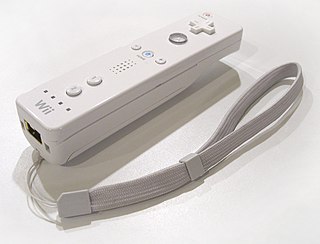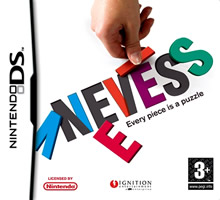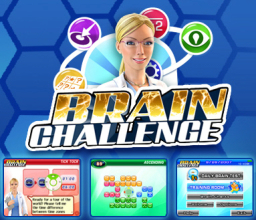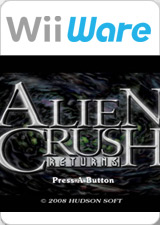
The Wii is a home video game console developed and marketed by Nintendo. It was released on November 19, 2006, in North America and in December 2006 for most other regions of the world. It is Nintendo's fifth major home game console, following the GameCube and is a seventh-generation console alongside Microsoft's Xbox 360 and Sony's PlayStation 3.

WarioWare: Smooth Moves is a party video game developed by Nintendo SPD and Intelligent Systems. The game was published by Nintendo for its Wii video game system in Japan in December 2006, and in Europe, North America, and Australia in January 2007. It is the fifth game in the WarioWare series of games, and the only game in the series to be physically released for the Wii. Like its predecessors, WarioWare: Smooth Moves is built around a collection of microgames that last about five seconds each, and which require that the player hold the Wii Remote in specific positions. The game offers the microgames to the player in rapid succession, by first instructing the player to hold the Wii Remote in a specific manner, and then showing them the microgame. The microgames are divided into several stages, each of which loosely connects the microgames with the help of a story. Additionally, this was the first spin-off Mario game to be released for the console.

The Wii Remote, also known colloquially as the Wiimote, is the primary game controller for Nintendo's Wii home video game console. An essential capability of the Wii Remote is its motion sensing capability, which allows the user to interact with and manipulate items on screen via motion sensing, gesture recognition, and pointing which is used for the console, using accelerometer and optical sensor technology. It is expandable by adding attachments. The attachment bundled with the Wii console is the Nunchuk, which complements the Wii Remote by providing functions similar to those in gamepad controllers. Some other attachments include the Classic Controller, Wii Zapper, and the Wii Wheel, which has originally been used for the racing game, Mario Kart Wii.

Wii Play is a party video game developed and published by Nintendo for the Wii console. It was released as a launch game for the console in Japan, Europe, and Australia in December 2006, and was released in North America in February 2007. The game features nine minigames, including a Duck Hunt-esque shooting range, a fishing game, and a billiards game, each of which are designed to showcase the features of the Wii Remote controller.

Neves is a puzzle video game developed by Yuke's Media Creations for the Nintendo DS, based on the Japanese Lucky Puzzle, a tangram-like dissection puzzle. In the game, players use the stylus to move, rotate and flip pieces on the DS's touch screen to clear puzzles. It features over 500 different puzzles from which to choose.

Brain Challenge is a mental exercise video game, featuring "brain exercise puzzles". The game was developed by Gameloft Beijing for mobile phone and iPod and released on September 5, 2007. In 2008 was followed by a Nintendo DS version on January 8, an Xbox Live Arcade release on March 12, and a PlayStation 3 launch on November 27. The N-Gage 2.0 version was released on the day of the service's launch, April 3, 2008. A version for WiiWare was released in autumn 2008 on all three regions. The Wii version also uses Miis for the players profile. OnLive also had launched their new streaming game platform with Brain Challenge on July 27, 2010. The game was released for Mac OS X in January 2011.

Lit and also known as School of Darkness in Japan, is a video game by WayForward Technologies for WiiWare. The game is directed by Adam Tierney and co-designed by Tierney and Mark Bozon. It was released in North America on February 9, 2009.

The Wii MotionPlus (Wiiモーションプラス) is an expansion device for the Wii Remote, the primary game controller for the Wii. The device allows more complex motion to be interpreted than the Wii Remote can do alone. Both the Wii and its successor, the Wii U, support the Wii MotionPlus accessory in games.

Tetris Party is a puzzle video game by Hudson Soft for WiiWare. An installment of the Tetris series, the game supports the use of Miis and the Wii Balance Board, and features both local and online multiplayer in addition to several single-player modes unique to the game.

Alien Crush Returns is a WiiWare pinball video game developed by Tamsoft and published by Hudson Soft. It is a sequel/remake to 1988's Alien Crush, and is the fourth installment in the Crush Pinball series. It was released in Japan on August 26, 2008, in North America on November 3 and in Europe on November 7.
MaBoShi: The Three Shape Arcade is a WiiWare puzzle video game developed by Mindware Corp. Its Japanese title, Katachi no Game: Maru Bou Shikaku. It was released in Europe on August 29, 2008, in Japan on October 7, 2008, and in North America on December 29, 2008.

Onslaught is a first-person shooter for WiiWare by Hudson Soft. It was released in Europe on February 13, 2009, in North America on February 23, 2009, and in Japan on March 3, 2009.

And Yet It Moves is a puzzle-platform game developed by independent developer Broken Rules. The game was released for Microsoft Windows, Mac OS X, and Linux on April 2, 2009, and for Wii as a WiiWare title in August 2010. And Yet It Moves was originally designed as a computer science project at the Vienna University of Technology in 2007. When the original prototype won or was nominated for awards at various independent game festivals, the team decided to create a full version of the game.

Tournament of Legends is a fighting video game developed by High Voltage Software for the Wii console.
Since the release of the Nintendo Wii, many aesthetic, ergonomic and functional accessories have been developed by third parties for the console’s controller, the Wii Remote.

Just Dance is a 2009 music rhythm game developed by Ubisoft Milan and Ubisoft Paris and published by Ubisoft as the first main installment of the Just Dance series. The game was released exclusively for the Wii on November 17, 2009, in North America, November 26, 2009, in Australia, and November 27, 2009, in Europe.

Hubert the Teddy Bear: Winter Games is a sports party game developed by Teyon for the WiiWare. It was available in the WiiWare Shop for 500 Wii Points before the shop's closure in 2019.

Wii Play: Motion is a video game for the Wii console and the sequel to the 2006 game Wii Play. It was released in North America on June 13, 2011; Europe on June 24; and Australia on June 30, 2011.
Deca Sports, is a series of sports video games developed and published by Hudson Soft, a former subsidiary of Konami.















